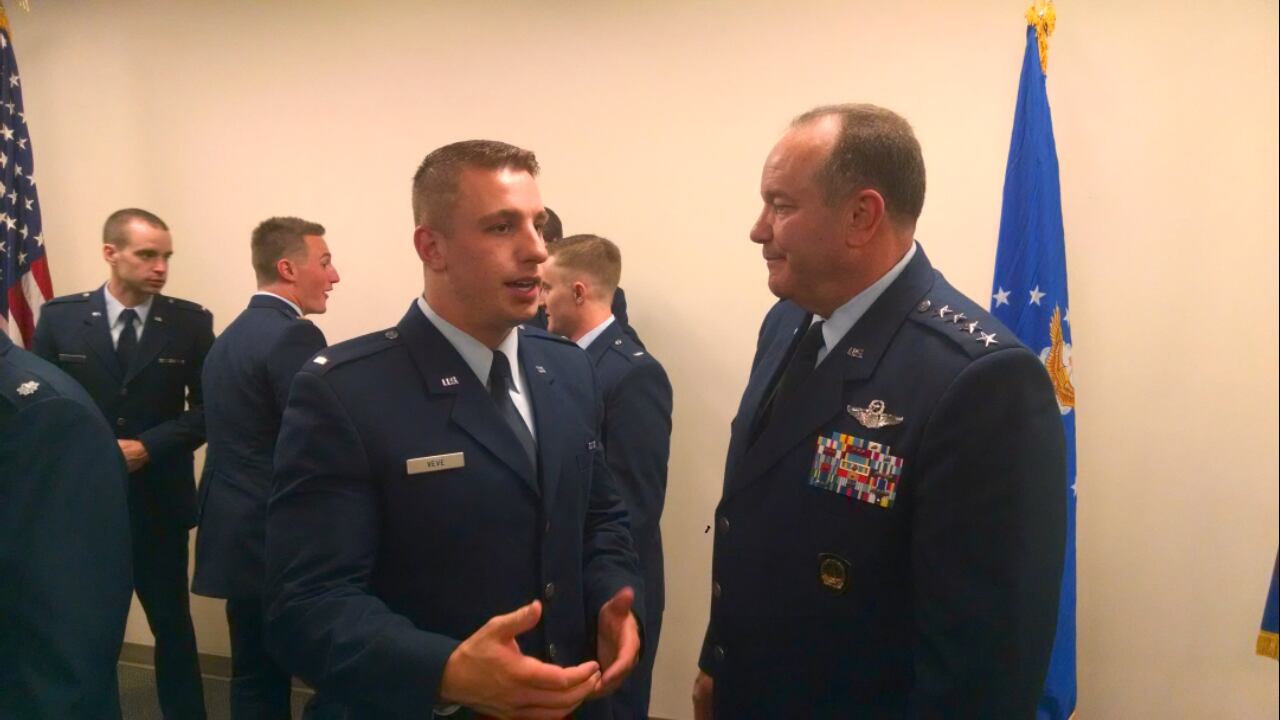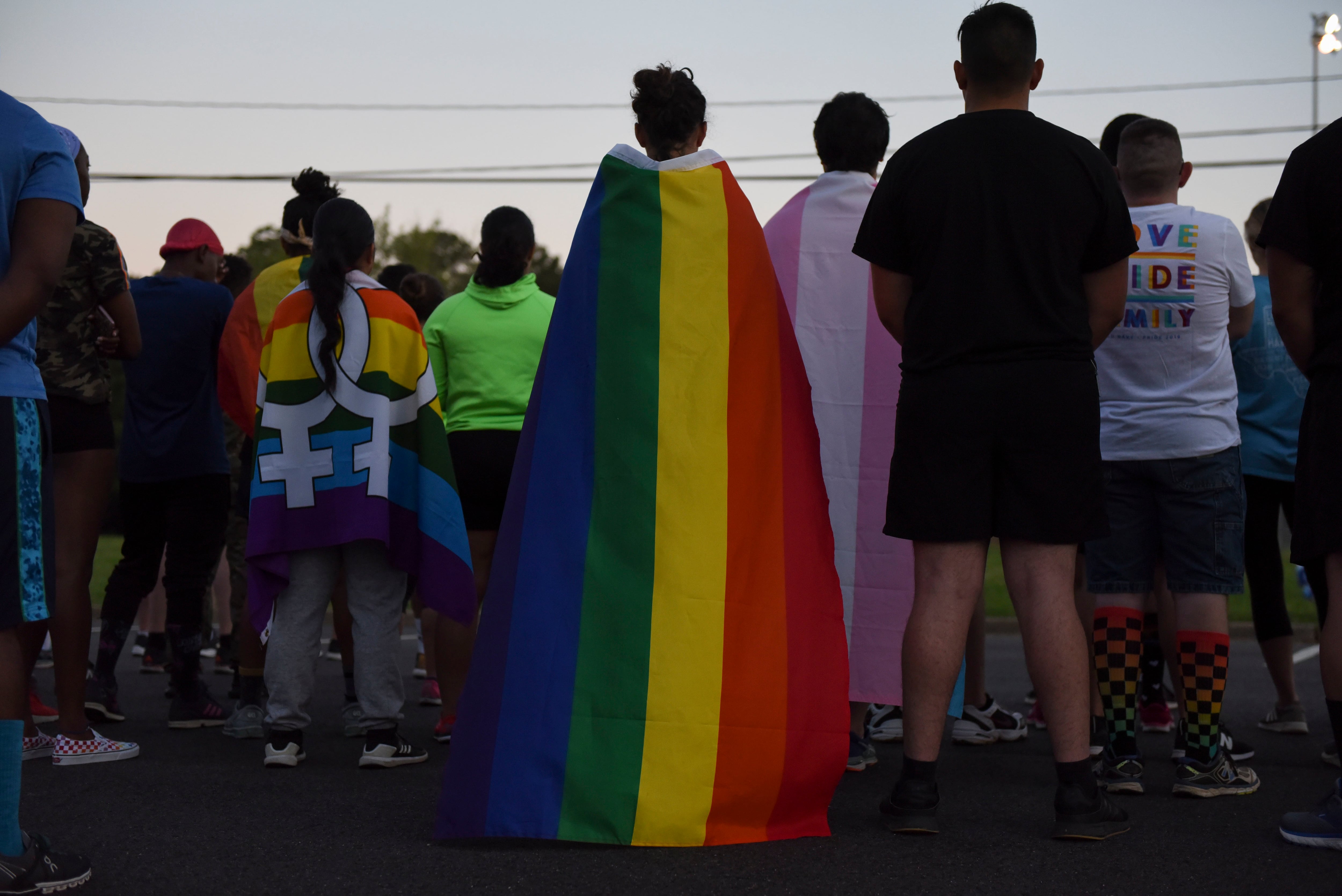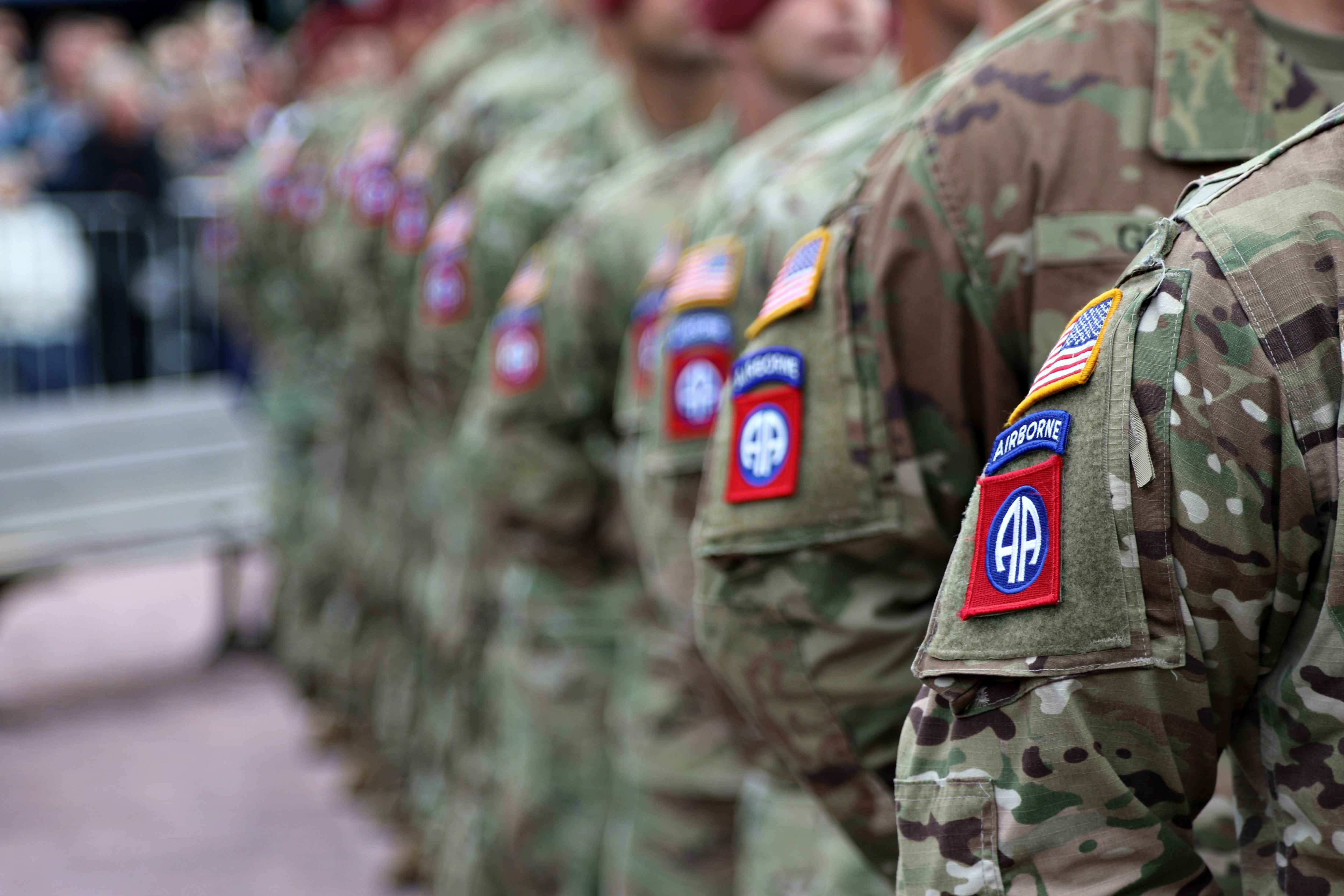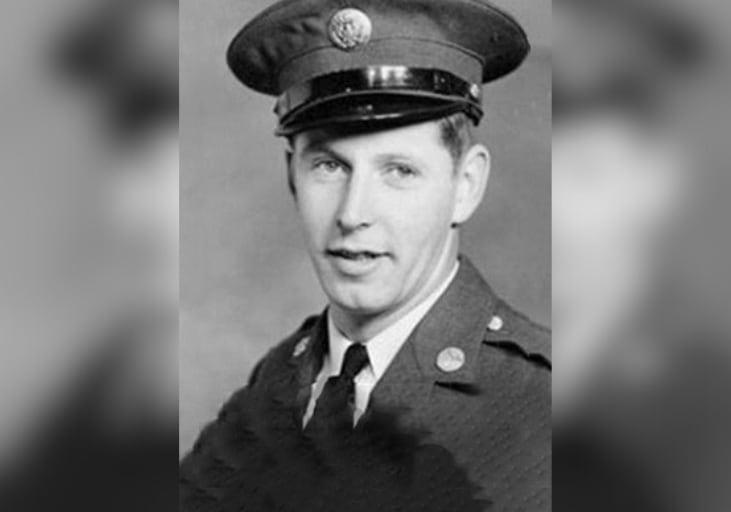On a partly cloudy day in March 1976, then-Capt. Rafael Veve Sr. took his son, 9-year-old Rafael Jr., up in a single-engine Grumman American AA-5. They flew from Shreveport, Louisiana, to Texas for cheeseburgers.
It was Rafael Jr.'s first flight, and it changed his life. From then on, he wanted nothing more than to follow in his father's footsteps and become an Air Force pilot.
Twenty-two years later, the family tradition continued. Shortly before Rafael Jr.'s son Grant turned 6, he got his own first flight with his grandfather at the controls, this time in a two-seater Cessna 152 at the Space Coast Regional Airport in Titusville, Florida. They even took a low-level approach over the space shuttle runway at Cape Canaveral.
And on May 1, Grant became the third generation of Veves to become Air Force officers when he was sworn in by his mentor, NATO Supreme Allied Commander and Commander of U.S. European Command Gen. Philip Breedlove. In September, Grant was one of 52 cadets selected to attend the Euro-NATO Joint Jet Pilot Training program at Sheppard Air Force Base in Texas. He'll begin that training next year, after he finishes a master's degree in management at the University of Florida. And when he completes pilot training in 2017, he will also become the third Veve in a row with pilot's wings.
"I totally get now how big a deal it was, for my dad, for me to follow his footsteps," Rafael Jr. said in an interview. "I've never pushed Grant, or urged him, or even suggested that he go in the Air Force [as a career], other than ROTC for the scholarship help with a [mechanical] engineering degree. I'm more proud that he has realized that and chosen that path all on his own."
Both Rafael Sr. and Grant entered the Air Force through Air Force ROTC. Rafael Sr. graduated from the University of Puerto Rico in 1966, and Grant graduated from Georgia Tech last month. Rafael Jr. graduated from the Air Force Academy in 1988.
Air Force ROTC had 12,193 cadets in fiscal 2014, according to Air Education and Training Command, but the number fluctuates year to year and has reached as high as 17,513.
Grandfather flew in Vietnam
Rafael Sr., the son of a U.S. Customs inspector, grew up in a suburb of San Juan, and wanted to fly since he was a kid. He was the youngest of four children in his family, and one of his three older sisters was married to a Federal Aviation Administration inspector who would take the 4- or 5-year-old boy to the airport to see the giant planes.
"The first time he saw a big airplane at the airport, he … told his dad, 'I'm gonna fly one of those,'" Rafael Jr. said.
Rafael Sr. rose to become a cadet commander and was the distinguished graduate in his class. He went to flight school at the now-closed Reese Air Force Base in Texas, when in 1966, Rafael Jr. was born.
"I always tease him that was the dumbest move he could ever make, is having a baby in the middle of pilot training," Rafael Jr. said.
Rafael Sr. flew KC-135s as a co-pilot in Vietnam, and later flew rescue helicopters in South Korea. He then became a KC-135 instructor pilot, a flight commander, a squadron commander and the deputy ops group commander at Robins Air Force Base in Georgia before retiring in 1988 as a lieutenant colonel. Rafael Jr. had just been commissioned and was in the jump seat for Rafael Sr.'s final flight.
"It was the biggest thrill" to fly side-by-side with his father once again, Rafael Jr. said. "He was a real pilot's pilot."
Rafael Sr. then flew 16 years with Delta Airlines before retiring for good. All three generations of Veves were also on Rafael Sr.'s final flight at Delta, though his son and grandson were only passengers.
Father's time was Desert Storm
Rafael Jr. took his second step toward becoming a pilot at age 16, when he got a scholarship to learn how to fly solo after winning an essay contest about freedom. After graduating from the academy, he flew KC-135As at Dyess Air Force Base in Texas as a co-pilot, and said he was on the first crew to take off from Incirlik Air Base in Turkey at the start of Operation Desert Storm. He later flew KC-10s. He left active duty as a captain after nine years, because he was deploying frequently and "I wanted to stay home and see my son's Little League games." He stayed in the Air Force Reserve for another two years and then became a United Airlines pilot.
New 2nd lieutenant
Rafael Jr. said Grant wasn't necessarily thinking about an Air Force career because Grant remembered how often his father was gone. When Grant needed to find a way to cover the expensive tuition at Georgia Tech, his dad said he decided to go ROTC, do four years in the Air Force as an engineer, and then become a civilian.
But Grant quickly became impressed by how serious and professional ROTC was, and in his freshman year, he decided to make a career out of it — and that he wanted to fly.

Grant Veve talks with his mentor and fraternity brother, Gen. Philip Breedlove.
Photo Credit: Courtesy of Veve family
And when Grant pledged the Pi Kappa Alpha fraternity at Georgia Tech his sophomore year, he met one of that chapter's most famous alums: Breedlove.
"They hit it off instantly," Rafael Jr. said.
Breedlove continued corresponding with Grant over the next few years, and offered Grant advice on things like pilot training and leadership, and encouraged him to apply to the Euro-NATO program. Grant said Breedlove also gave him life advice, and reminded him not to forget the importance of family even while shouldering the responsibilities of a military career.
"You can be a good family man, and also a great officer," Grant said Breedlove taught him.
Grant continued to excel at Georgia Tech, and became his ROTC's flight commander and president of his fraternity. In November, Grant was elected Mr. Georgia Tech with the help of a humorous online video that parodied the Dollar Shave Club ads.
Breedlove was in the VIP section during homecoming when Grant was crowned Mr. Georgia Tech, Rafael Jr. said. And at Grant's commissioning last month, Breedlove told him how proud he was of how the new second lieutenant led his fraternity.
"I can't overstate the amount of impact his mentorship has had on me," Grant said. "I understand that's a crazy opportunity for a cadet to talk to a four-star general on that basis. Hopefully, if I ever get to be that high up, I can be that down-to-earth and caring to other cadets."
Grant Veve said he hopes to fly an F-22, "or anything with an F in front of it," or an A-10, B-1 or B-2.
Rafael Jr. said that before he went off to fight his own war, his father was concerned, but confident in his son's flying abilities. He told Rafael Jr. to be careful and come home safe.
"He was extremely proud," Rafael Jr. said of their conversations before Desert Storm. "He's always been very proud. And now I know what he was talking about."
Stephen Losey is the air warfare reporter for Defense News. He previously covered leadership and personnel issues at Air Force Times, and the Pentagon, special operations and air warfare at Military.com. He has traveled to the Middle East to cover U.S. Air Force operations.





